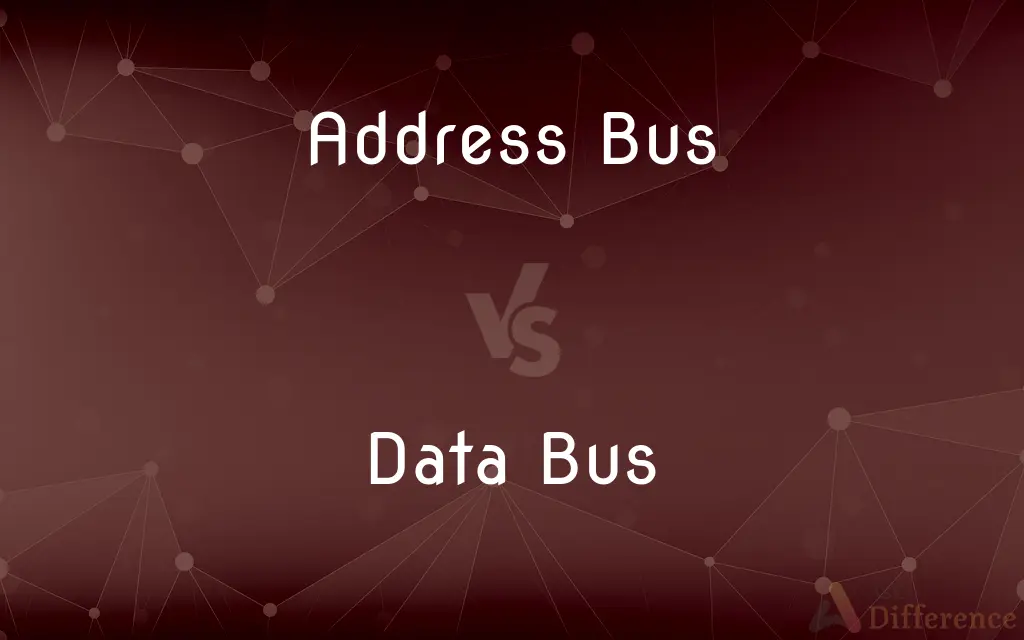Address Bus vs. Data Bus — What's the Difference?
By Tayyaba Rehman — Published on October 20, 2023
The Address Bus specifies memory locations, while the Data Bus transfers actual data between components.

Difference Between Address Bus and Data Bus
Table of Contents
ADVERTISEMENT
Key Differences
The Address Bus and the Data Bus are two distinct pathways within a computer's central processing unit. The Address Bus is designed to pinpoint the exact location or address in the memory where data needs to be accessed or stored. On the flip side, the Data Bus is tasked with transmitting the actual data between the processor, memory, and other hardware components.
While both buses play crucial roles in the computer's operation, their functions don't overlap. The Address Bus identifies 'where' the operation will happen, effectively determining the memory slot. The Data Bus, meanwhile, deals with the 'what,' carrying the data values that are either being fetched from or sent to that memory location.
It's helpful to think of the Address Bus as the computer's navigation system, guiding operations to the right destination. In contrast, the Data Bus acts like the delivery truck, ferrying information to and from that specified address. A computer's efficiency largely relies on these buses working in tandem, optimizing speed and accuracy.
Address and Data Buses, though different in their roles, work simultaneously. When a processor needs data from a particular memory spot, the Address Bus locates this spot, while the Data Bus retrieves or sends the relevant data. This synchronicity ensures that the computer functions seamlessly, maintaining its operational rhythm.
Comparison Chart
Primary Function
Identifies memory locations
Transfers data between components
ADVERTISEMENT
Nature of Transmission
Addresses or memory locations
Actual data or information
Directionality
Usually unidirectional (from CPU to memory)
Bidirectional (can transfer data to and from the CPU)
Width
Defined by the number of memory locations
Defined by the size of data chunks the system can process at once
Dependency
Independent of the data value
Dependent on the value being transferred
Compare with Definitions
Address Bus
The hardware line that sends addresses from the CPU to the main memory.
The efficiency of the Address Bus impacts the computer's overall speed.
Data Bus
A channel for data transmission between components.
The speed of the Data Bus determines how fast information moves within the system.
Address Bus
The system's means to select memory locations.
Without the Address Bus, the CPU wouldn't know where to store or retrieve data.
Data Bus
A bus in a computer system that transfers data.
The Data Bus moved the file from the RAM to the CPU.
Address Bus
A pathway that carries location identifiers.
The Address Bus indicates the exact slot in memory for operations.
Data Bus
A pathway responsible for shuttling actual data.
Any data you see or work with has traveled via the Data Bus.
Address Bus
A bus in a computer that transmits memory addresses.
The Address Bus ensures that data goes to the right memory slot.
Data Bus
The system's transporter of actual information values.
The movie played smoothly because of the quick Data Bus transfers.
Address Bus
A component that designates 'where' in memory an operation takes place.
The Address Bus directed the operation to the correct RAM slot.
Data Bus
A bidirectional conduit for data within a computer.
When you save a file, the Data Bus carries that data to its storage location.
Common Curiosities
Is the Data Bus always bidirectional?
Typically, yes, as it both sends and receives data.
Do all computers have the same width for their Address and Data Buses?
No, bus width varies based on the computer's design and needs.
What's the main purpose of the Address Bus?
It identifies specific memory locations for operations.
What does the Data Bus do?
It transfers actual data between computer components.
Why do we need both Address and Data Buses?
The Address Bus locates memory slots, while the Data Bus transfers data to/from those slots.
Are there other buses in a computer system besides the Address and Data Buses?
Yes, like the Control Bus, which manages commands and timing.
How does a wider Data Bus affect performance?
A wider Data Bus can transfer more data simultaneously, improving speed.
Does the Data Bus only connect to memory?
No, it connects various components, including the CPU, memory, and I/O devices.
Can a computer function without an Address Bus?
No, it's essential for directing operations to the correct memory spots.
Do the Address Bus and Data Bus ever intersect?
They function in tandem but are separate pathways.
Can a computer's performance be bottlenecked by its Data Bus?
Yes, if the Data Bus is too slow or narrow, it can limit the system's speed.
How does the Address Bus locate memory locations?
It carries address signals from the CPU to memory.
Which bus carries instructions about data operation?
That's typically the role of a Control Bus, not the Address or Data Bus.
Can the Address Bus width determine the maximum memory a system can have?
Yes, the number of addresses it can send determines the maximum accessible memory.
How does the Data Bus width affect data transfer rate?
A wider Data Bus can transfer larger chunks of data at once, increasing the rate.
Share Your Discovery

Previous Comparison
Disguise vs. Masquerade
Next Comparison
Power Steering vs. Manual SteeringAuthor Spotlight
Written by
Tayyaba RehmanTayyaba Rehman is a distinguished writer, currently serving as a primary contributor to askdifference.com. As a researcher in semantics and etymology, Tayyaba's passion for the complexity of languages and their distinctions has found a perfect home on the platform. Tayyaba delves into the intricacies of language, distinguishing between commonly confused words and phrases, thereby providing clarity for readers worldwide.














































